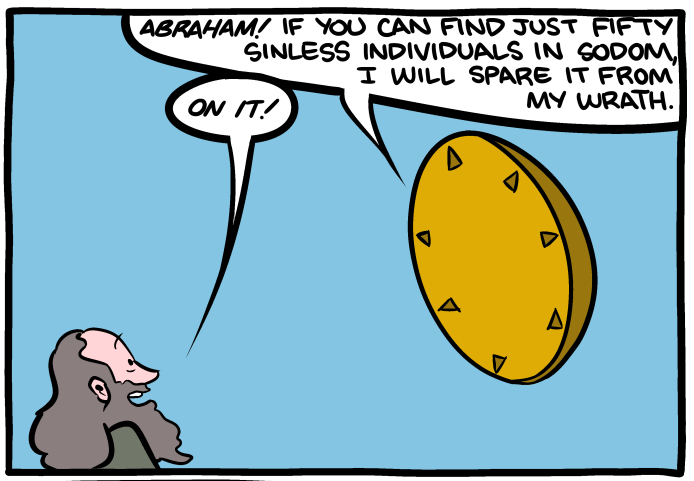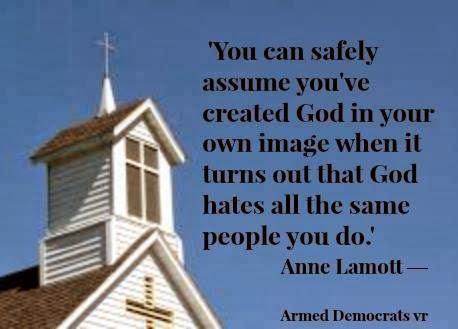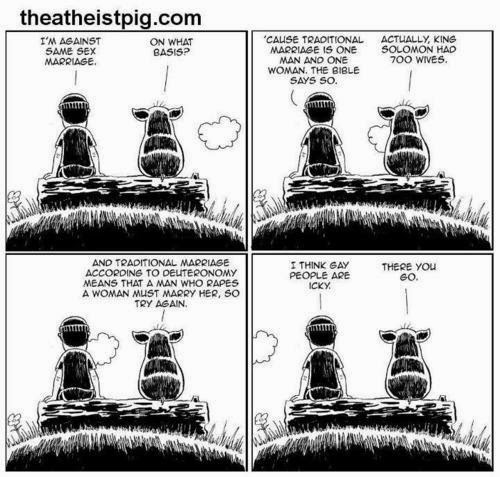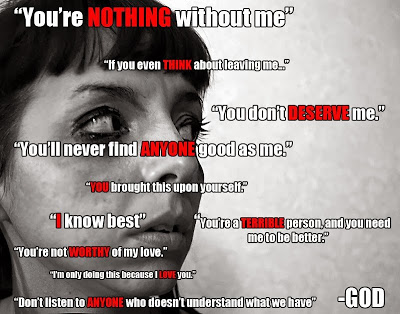Living Righteously in a Wicked World
Genesis 13–14; 18–19
Links to the reading in the SAB: Genesis 13, Genesis 14, Genesis 18, Genesis 19
LDS manual: here
Background
We’ll get back to Abraham in the next lesson, but first we’re going to follow a side plot involving Abraham’s nephew Lot.
We will now turn the time over to Brother Professor, who will favour us with what must be the greatest Sunday School lesson ever. (Would that I could teach with such inspiration.) It’s all you need to know about Lot.
Now I’m wondering if Brad Neely once attended my Sunday School class. Embarrassingly, I think I once actually taught that bit about angels being terrifying.
I do love the bit about Abraham haggling god down to ten righteous people. He should have done it like this, though.
Main points of this lesson
The god of the Bible is a homophobic and destructive asshole.
Lot’s wife (she didn’t even get a name in the OT) was turned into a pillar of salt for the sin of looking. This will be just one in a series of murders Jehovah commits due to his arbitrary commands.
Read this poem by Karen Finneyfrock.
What Lot’s Wife Would Have Said (If She Wasn’t A Pillar of Salt)
Do you remember when we met
in Gomorrah? When you were still beardless,
and I would oil my hair in the lamp light before seeing
you, when we were young, and blushed with youth
like bruised fruit. Did we care then
what our neighbors did
in the dark?
Go read the whole thing and come back.
There are two great points to be made in the poem. One is a question about Jehovah’s act of destroying the city: Is any form of loving this indecent?
Ask: Which is more immoral: loving who you want, or raining down fire and destruction on people?
Answer: That’s a rhetorical question, people.
Gods are a reflection of the people who believe in them
The other great point from this poem is in this line:
Because any man weak enough to hide his eyes while his neighbors are punished for the way they love deserves a vengeful god.
Ask: In what sense do we get the kind of god we deserve?
If gods don’t exist, then theism is an exercise in invention, and it’s often been said that people invent gods in their own image. Compassionate people invent compassionate gods. Horrible people invent horrible gods. Tribal people invent tribal gods. People who are obsessed with other people’s sexual behaviour have gods who are obsessed with other people’s sexual behaviour. And of course, deeply homophobic people have a deeply homophobic god. The character of God varies wildly between believers, but the god of a group of people always seems to reflect their values at the time, in precise detail. What more evidence do we need to show that god-belief is an exercise in projection, and not the reliable description of a real and externally verifiable being?
Even so, it’s nice to see it verified experimentally. Here’s the work of psychologist Nicholas Epley.
For many religious people, the popular question “What would Jesus do?” is essentially the same as “What would I do?” That’s the message from an intriguing and controversial new study by Nicholas Epley from the University of Chicago. Through a combination of surveys, psychological manipulation and brain-scanning, he has found that when religious Americans try to infer the will of God, they mainly draw on their own personal beliefs.
Epley found that by manipulating people’s opinions, he could also manipulate their ideas about what God is into.
He showed some 145 volunteers a strong argument in favour of affirmative action (it counters workplace biases) and a weak argument opposing it (it raises uncomfortable issues). Others heard a strong argument against (reverse discrimination) and a weak argument for (Britney and Paris agree!). The recruits did concur that the allegedly stronger argument was indeed stronger. Those who read the overall positive propaganda were not only more supportive of affirmative action but more likely to think that God would be in the pro-camp too.
And when Epley got people into an fMRI machine to see what parts of their brain were active when they were thinking about what God would do, he found that they were using the same part of their brain that they used when were thinking about what they would do.
Jesus was probably not a gay-friendly guy
There’s another point to be made about projection. This is not to plunder future lessons, but let’s just take a moment to remember that, according to LDS doctrine, the god who destroyed Sodom was the pre-mortal Jehovah, soon to become Jesus. As such, claims that Jesus never said anything against homosexuality fall somewhat flat. True, he did go sort of quiet on this issue during his ministry — embodiment must have chilled him out some — but the guy was a first-century rabbi who had no problem with the Levitical law; why would he have been a progressive 21st century liberal?
The blog post ‘Jesus was not a queer ally‘ from Godlessness in Theory makes some great points:
On every continent on earth (except Antarctica), Christianity has othered and outlawed queer sexuality. Whatever Jesus thought about it, assuming he lived at all, this is the movement he inspired.
…
He says nothing about gay sex, we’re told as if this proves he had no objection. (Curiously, the same doesn’t apply to slavery or rape.) He doesn’t even mention queer people. I’m afraid when I hear someone takes my side, acknowledging I exist is the least I expect from them.
…
- It is absurdly generous to call someone a queer ally whose name we only know because they spurred a movement that overwhelmingly harmed us for thousands of years.
- It is absurdly generous to call someone a queer ally because they never said a word about us, particularly to a violently homophobic audience.
- It is absurdly generous to call someone a queer ally for preaching nonspecific love and kindness. That never stopped anyone, let alone preachers, persecuting us.
It’s encouraging that some Christians are using their own good moral conscience to project their compassion onto Jesus, but there’s little basis for it, and it would be better for them to own their better impulses instead of trying to bank-shot it off Jesus.
We have a responsibility not to be hateful bigots
Ask: Returning to the poem, how might someone “hide his eyes while his neighbors are punished for the way they love”?
A personal story: Some years ago in 2008, Richard Raddon caused a stir. He was the director of the Los Angeles Film Festival, but resigned when it came out that — in accordance with his Mormon views — he’d donated to help Proposition 8 in California. People were baffled. How could he work alongside actors (one of the gayest professions), and then contribute to tearing down their rights and their families? What was he thinking?
I knew Raddon, briefly. When we were at BYU way back in 1986, we acted together in a production of West Side Story. He was a Shark, and I was one of the adults because I couldn’t dance. We also both lived on the same dorm floor: Deseret Towers, W Hall, 6th floor. We even used to chat about the topic of this lesson — how to maintain one’s standards in an immoral profession.
Rich was a cool guy. He didn’t strike me as someone who would promote a homophobic agenda. And yet he did. But that’s the kind of thing that religion can do to cool people: make them ignore their compassionate impulses to promote a terrible out-dated ideology.
As Steven Weinberg puts it:
Additional ideas for teaching
Mormons imagine that by simply living among us, they are the reason that God hasn’t killed us all
What does Genesis 19:29 suggest was the reason Lot was spared when Sodom and Gomorrah were destroyed? (The Lord remembered the righteousness of Abraham.) How can our righteous behavior benefit others?
This leads to a quote from S.W. Kimball:
Of course, there are many many upright and faithful who live all the commandments and whose lives and prayers keep the world from destruction.
Ask: What might be the psychological effect of imagining that by being a Mormon, you are preventing God from destroying the world?
Answers: A view that you (by living the gospel) are taking the hero’s role, while your neighbours (by not living the gospel) are recklessly endangering the world by tempting the god you worship to destroy everyone. This is reinforced by comparisons throughout the lesson between our society and that of Sodom.
Other effects may include quixotic attempts to save the world by going on a hunger strike to protest gay marriage, or buying up a raft of immoral tops so no one else can.
Dear Mormons who think this: Thanks for your efforts, and we really appreciate your attempts to be decent people. But we don’t need you to save us, and if you all disappeared, we’d be fine. Society is an adaptable self-organising network. Yes, we have our issues and problems, but we don’t need to be told that your god is coming to destroy us. We’re normal people getting on with the work of living, figuring things out, and learning how to get along. Feel free to join us, but spare us your hectoring and hand-wringing.
The sin of Sodom is not homosexuality
It’s true that Jehovah is no fan of gay people, as we’ll see when we get to Deuteronomy, but when Ezekiel gave his description of Sodom’s sins, buttsecks was way down the list.
16:49 Behold, this was the iniquity of thy sister Sodom, pride, fulness of bread, and abundance of idleness was in her and in her daughters, neither did she strengthen the hand of the poor and needy.
16:50 And they were haughty, and committed abomination before me: therefore I took them away as I saw good.
If homosexuality is the abomination described in verse 50, it barely made the cut. More serious are sins like greed and not helping the poor.
God ensures perpetual political strife
13:14 And the LORD said unto Abram, after that Lot was separated from him, Lift up now thine eyes, and look from the place where thou art northward, and southward, and eastward, and westward:
13:15 For all the land which thou seest, to thee will I give it, and to thy seed for ever.
…thus ensuring that the Middle East would be a political mess and a churning cycle of violence forever. Good one, Jehovah.









Recent Comments